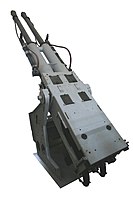Bofors 57 mm Naval Automatic Gun L/60
| Bofors 57 mm Naval Automatic Gun L/60 | |
|---|---|
 Swedish Bofors 57 mm SAK 60 (57 mm akan m/50) on the destroyer HSwMS Småland (J19) | |
| Type | Naval Gun |
| Place of origin | Sweden |
| Service history | |
| In service | 1952 – 1990 |
| Used by | Dutch Navy Swedish Navy French Navy |
| Production history | |
| Designed | 1950 |
| Manufacturer | Bofors |
| Specifications | |
| Mass | Traversing mass: 24 t (53,000 lb) |
| Barrel length | 60 calibres (3.420 m) |
| Crew | 8 |
| Shell | 57 × 438 mm R (m/50) |
| Calibre | 57 mm |
| Elevation | -9°/+90°, 30°/s |
| Traverse | -360°, 30°/s |
| Rate of fire | 2 × 130 rounds/min |
| Muzzle velocity | 850 – 920 m/s |
| Effective firing range | 13000 metres (max) 5000 metres (practical) 5500 meters AA ceiling |
Bofors 57 mm Naval Automatic Gun L/60 (Swedish: 57 mm sjöautomatkanon L/60 (57 mm SAK 60)),[1][2] also known as 57 mm/60 (2.25") SAK Model 1950[3] and the like (full English product name: Bofors 57 mm Automatic A.A. Gun L/60 In Stabilized Twin Turret),[4] was a twin-barreled 57 mm (2.2 in) caliber fully automatic dual purpose naval artillery piece designed by the Swedish arms manufacturer Bofors from the end of the 1940s to the early 1950s to meet a request from the Dutch Navy.[1] Besides the Dutch Navy, the weapon was also adopted by the Swedish and the French Navy, most predominantly by the latter.[3]
Design[]
The Bofors 57 mm Naval Automatic Gun L/60 is at its core a scaled up version of the famous Bofors 40 mm Automatic Gun L/70, but constructed as a twin-gun system sharing the same receiver/mantle with ammunition feeding from the sides into each gun.[1] The guns were water-cooled and fed by large 80-cartridge magazines that allowed several long bursts to be fired without reloading.[3]

French "57mm/60 modèle 1951" on display at Port-Louis naval museum.

French "57mm/60 modèle 1951" on display at Port-Louis naval museum.
[]

The Dutch were the initial users of the Bofors 57 mm Naval Automatic Gun L/60. As part of rebuilding the Dutch Navy post WWII, the Dutch Navy had requested several naval gun systems to be developed by Bofors for their next generation of naval-vessels,[5] one being a twin-barreled 57 mm dual-purpose gun for the planned De Zeven Provinciën-class cruisers HNLMS De Ruyter (C801) and HNLMS De Zeven Provinciën (C802).[1] This request led to the creation of the Bofors 57 mm Naval Automatic Gun L/60, which entered active service with the Dutch Navy in 1953 mounted on the cruisers Hr.Ms. de Ruyter (C801) and Hr.Ms. De Zeven Provinciën (C802).
[]

Following the Dutch example, the Swedish navy decided to acquire the new 57 mm system for a new generation of destroyers in 1950. In Swedish service the weapon was fitted to the Halland-class destroyers HSwMS Halland (J18) and HSwMS Småland (J19), both of which entered service in 1956.[1] The weapon was initially designated 57 mm automatkanon m/50 (57 mm akan m/50),[6] meaning "57 mm autocannon m/50", but around 1970 the weapon was redesignated to 57 mm torndubbelautomatpjäs m/50 (57 mm tdblapjäs m/50),[7][8] meaning "57 mm turret double automatic piece m/50" (literal).
The gun was in use until the Halland-class destroyers were taken out of service.
[]

The Bofors 57 mm L/60 naval gun was also purchased by the French Navy and came to serve on a number of naval-vessels under the designation 57mm/60 modèle 1951 (57mm/60 mle 51) from 1952 onward, although primarily post 1956.[3] The French navy version of the system featured a French designed naval mount that maintained the system in mechanical equilibrium, even when firing.[3]
In French service the gun notably armed light escorts as main guns and larger ships as secondary guns. The following French ships were armed with the 57mm/60 mle 51 system:[3]
- Jean Bart 1940-battleship (1952 retrofit)
- De Grasse anti-aircraft cruiser
- Colbert (C611) anti-aircraft cruiser
- Le Normand-class frigate
- T 47-class fleet escorts (also known as the "Surcouf-class")
- T 53-class fleet escorts
See also[]
- Bofors 57 mm Automatic Anti-Aircraft Gun L/60 – single gun anti air development of the Bofors 57 mm Naval Automatic Gun L/60
- Bofors 57 mm Naval Automatic Gun L/70 – single gun replacement design for the Bofors 57 mm Naval Automatic Gun L/60
- Bofors 120 mm Automatic Gun L/50
References[]
Notes[]
- ^ a b c d e "Bofors automatic 57mm Dual-Purpose guns". tfd.chalmers.se. Archived from the original on 2007-07-01. Retrieved 2021-09-14.
- ^ "030306_SAK57_Mk3.pdf" (PDF). boflv.se. Bofors Luftvärnsförening (Bofors Anti-Aircraft Association). 2003. Archived (PDF) from the original on 2010-09-11. Retrieved 2021-11-19.
- ^ Bofors (in Swedish). Karlskoga, Sweden: AB Bofors, Karlskoga (Boforskoncernen). 1958. p. 87.
- ^ "120 mm Bofors naval guns". tfd.chalmers.se. Archived from the original on 2007-05-18. Retrieved 2021-11-19.
- ^ Amreg Fl, Ammunitionsregister för flottan, 1955 (in Swedish). Stockholm, Sweden: Ammunitionssektionen, Marinförvaltningens Artilleribyrå. 1955.
- ^ Amreg Marinen, Ammunitionsregister för marinen, 1962, ändringar 1965 (in Swedish). Stockholm, Sweden: Kungliga Marinförvaltningen. 1965.
- ^ AMKAT, Ammunitionskatalog, Data och bilder, Marinen, 1977 års utgåva (in Swedish). Stockholm, Sweden: Swedish Defence Materiel Administration (FMV). 1977.
External links[]
| Wikimedia Commons has media related to Bofors 57 mm/60 naval gun. |
- Naval guns of France
- 57 mm artillery
- Military equipment introduced in the 1950s

